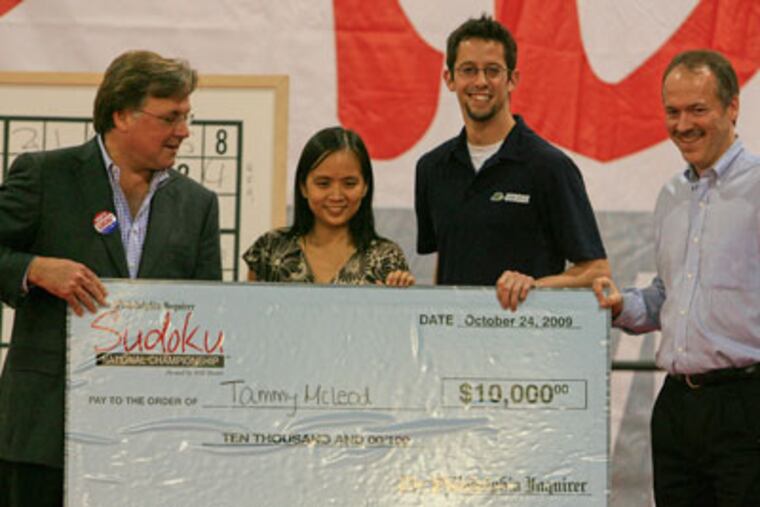Google programmer wins Sudoku championship in Philly
Tammy McLeod, 32, a programmer for Google who lives in Los Angeles, won the $10,000 top prize Saturday afternoon in the 3d annual National Sudoku Championship, sponsored by The Inquirer.

Tammy McLeod, 32, a programmer for Google who lives in Los Angeles, won the $10,000 top prize Saturday afternoon in the 3d annual National Sudoku Championship, sponsored by The Inquirer.
For McLeod - whose husband and 18-month-old daughter sat in the Convention Center audience as she carefully competed against two other top contenders - the third time was truly the charm. She had also competed in the first two national championships, and had finished a runner-up amnong the top three contestants each time.
"I'm a little stunned," she said when she came off the stage, where she and the other two contenders in the most difficult category had been vying on the same final puzzle, each on a large posterboard. "The only competition I've ever done is this competition."
In addition to the prize money, McLeod won an iPod and a seat on the United States team at the fifth annual World Sudoku Championsip, at which about 40 countries will compete in April. For the first time, the championship will be in the United States - in Philadelphia.
At Saturday's national competition, 646 contestants went after $25,000 in prizes and another 183 spectators solved the puzzles for fun.
The event is billed as America's largest puzzle championship because of the number of players it draws in day-long timed competitions in the numbers puzzle, which is popular around the world.
At the end of the day-long puzzle-solving, Brian Tierney, chief executive officer of Philadelphia Media Holdings, owners of The Inquirer, Daily News and Philly.com, unveiled a sign heralding the world competition here next year - an event he had sought. "The world's eyes will be upon us," he had told the contestants and spectators in comments that opened the competition this morning.
Contestants began streaming in early, and many immediately took a place at the long tables set up for the different skills divisions. There, they practiced on three preliminary puzzles they reeived as they walked in - Sudokus used for warm-ups, not for scoring. Wei-Hua Huang, 34, last year's winner of the $10,000 main prize, was practicing on them, too - an eraser in his left hand, a pencil in his right.
Speculation was that by the end of the day, the three contestants for the main prize, in the advanced category, would include Huang and the winner two years ago, his friend Thomas Snyder. The two, both from California, were rooming together her during the contest; they've written a new book of puzzles, Mutant Sudoku (Puzzle Wright Press), that tweaks the Sudoku format.
Will Shortz, puzzle editor of the New York Times and National Public Radio's puzzle master, again hosted the championship.
The largest number of contestants competed today in the beginner category - 323 in all, sitting at red-clothed tables. White-clothed tables were for the 254 intermediate players and black, for the 69 advanced contestants. The 183 spectators sat to the rear and sides of the hall, just at the outside of the contestant tables. In each of three elimination rounds, the contestants were asked to complete three puzzles at their levels within a half hour.
All were attempting to fill in the empty boxes - called cells - of the numbers puzzle that, according to an Inquirer survey, is the nation's most popular. Upward of 170 million Americans have played it.
The object of the game, which employs logic but requires no math skill other than the ability to count from one through nine, is to fill in all 81 squares in a grid divided into nine three-by-three boxes. Each row, column and box must contain every digit from one through nine. Between 17 and 33 squares are already filled with a number in each puzzle, and players determine what to place in the rest of the cells to complete it.
Most contestants Saturday were from Pennsylvania and New Jersey, and the farthest one traveled was from British Columbia in Canada. Many were repeats from the past two years, and were adjusting their strategies depending on what they already had discovered about their skills.
"I was in the intermediate level last year, and I was totally skunked, so I am in the beginner this year," said Richard Weishaupt, a lawyer from Chestnut Hill. Like others, Weishaupt had found that the contest's puzzles in each level were challenging - and racing against the clock was different from a leisurely spin at lunchtime or on commuter trains, where many people play Sudokus that appear in daily newspapers.